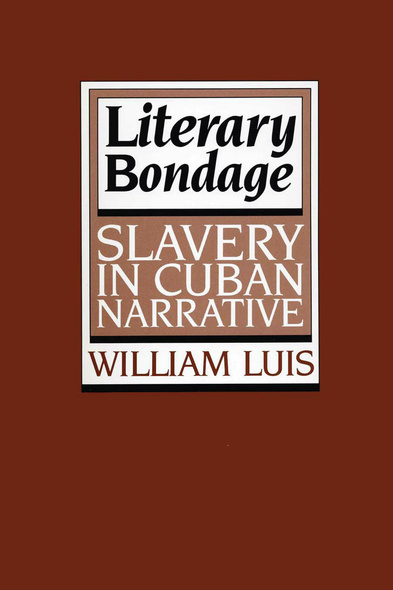Our shopping cart is currently down. To place an order, please contact our distributor, UTP Distribution, directly at utpbooks@utpress.utoronto.ca.
Literary Bondage
Slavery in Cuban Narrative
In the nineteenth century, the Cuban economy rested on the twin pillars of sugar and slaves. Slavery was abolished in 1886, but, one hundred years later, Cuban authors were still writing antislavery narratives. William Luis explores this seeming paradox in his groundbreaking study Literary Bondage, asking why this literary genre has remained a viable means of expression.
Applying Foucault's theory of counter-discourse to a vast body of antislavery literature, Luis shows how these narratives have always served to undermine the foundations of slavery, to protest the marginalized status of blacks in Cuban society, and to rewrite the canon of "acceptable" history and literature. He finds that emancipation did not end the need for such counter-discourse and reveals how the antislavery narrative continues to provide a forum for voices that have been silenced by the dominant culture.
In addition to such well-known works as Cecilia Valdés, The Kingdom of This World, and The Autobiography of a Runaway Slave, Luis draws on many literary works outside the familiar canon, including Romualdo, uno de tantos, Aponte, SofíaLa familia Unzúazu, El negrero, and Los guerrilleros negros. This comprehensive coverage raises important questions about the process of canon-formation and brings to light Cuba's rich heritage of Afro-Latin literature and culture.
... a distinct contribution to the study of black culture in Caribbean literature. Luis's research and his analysis of textual formation and of the texts themselves are all painstakingly executed.
- Preface
- Introduction. Fiction and Fact: The Antislavery Narrative and Blacks as Counter-Discourse in Cuban History
- 1. The Antislavery Narrative: Writing and the European Aesthetic
- 2. Textual Multiplications: Juan Francisco Manzano’s Autobiografía and Cirilo Villaverde’s Cecilia Valdés
- 3. Time in Fiction: Francisco Calcagno’s Romualdo, uno de tantos and Aponte and Martín Morúa Delgado’s Sofía and La familia Unzúazu
- 4. Historical Fictions: Displacement and Change—Lino Novás Calvo’s El negrero and Alejo Carpentier’s The Kingdom of This World
- 5. The Politics of Memory: Miguel Barnet’s The Autobiography of a Runaway Slave and César Leante’s Los guerrilleros negros
- 6. Present and Future Antislavery Narratives: Reinaldo Arenas’s Graveyard of the Angels
- Notes
- Bibliography
- Index





